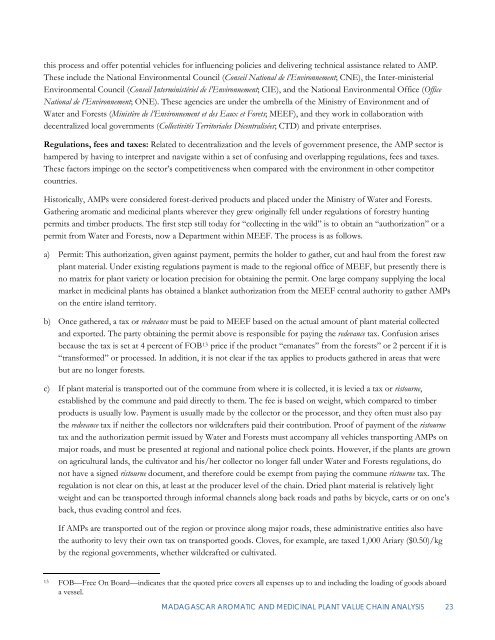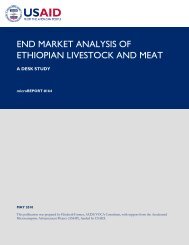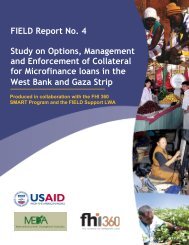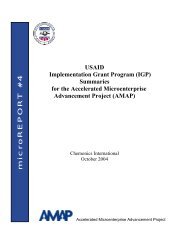Madagascar Aromatic and Medicinal Plants Value - Microlinks
Madagascar Aromatic and Medicinal Plants Value - Microlinks
Madagascar Aromatic and Medicinal Plants Value - Microlinks
Create successful ePaper yourself
Turn your PDF publications into a flip-book with our unique Google optimized e-Paper software.
this process <strong>and</strong> offer potential vehicles for influencing policies <strong>and</strong> delivering technical assistance related to AMP.<br />
These include the National Environmental Council (Conseil National de l’Environnement; CNE), the Inter-ministerial<br />
Environmental Council (Conseil Interministériel de l’Environnement; CIE), <strong>and</strong> the National Environmental Office (Office<br />
National de l’Environnement; ONE). These agencies are under the umbrella of the Ministry of Environment <strong>and</strong> of<br />
Water <strong>and</strong> Forests (Ministère de l’Environnement et des Eaux et Forets; MEEF), <strong>and</strong> they work in collaboration with<br />
decentralized local governments (Collectivités Territoriales Décentralisées; CTD) <strong>and</strong> private enterprises.<br />
Regulations, fees <strong>and</strong> taxes: Related to decentralization <strong>and</strong> the levels of government presence, the AMP sector is<br />
hampered by having to interpret <strong>and</strong> navigate within a set of confusing <strong>and</strong> overlapping regulations, fees <strong>and</strong> taxes.<br />
These factors impinge on the sector’s competitiveness when compared with the environment in other competitor<br />
countries.<br />
Historically, AMPs were considered forest-derived products <strong>and</strong> placed under the Ministry of Water <strong>and</strong> Forests.<br />
Gathering aromatic <strong>and</strong> medicinal plants wherever they grew originally fell under regulations of forestry hunting<br />
permits <strong>and</strong> timber products. The first step still today for “collecting in the wild” is to obtain an “authorization” or a<br />
permit from Water <strong>and</strong> Forests, now a Department within MEEF. The process is as follows.<br />
a) Permit: This authorization, given against payment, permits the holder to gather, cut <strong>and</strong> haul from the forest raw<br />
plant material. Under existing regulations payment is made to the regional office of MEEF, but presently there is<br />
no matrix for plant variety or location precision for obtaining the permit. One large company supplying the local<br />
market in medicinal plants has obtained a blanket authorization from the MEEF central authority to gather AMPs<br />
on the entire isl<strong>and</strong> territory.<br />
b) Once gathered, a tax or redevance must be paid to MEEF based on the actual amount of plant material collected<br />
<strong>and</strong> exported. The party obtaining the permit above is responsible for paying the redevance tax. Confusion arises<br />
because the tax is set at 4 percent of FOB 13 price if the product “emanates” from the forests” or 2 percent if it is<br />
“transformed” or processed. In addition, it is not clear if the tax applies to products gathered in areas that were<br />
but are no longer forests.<br />
c) If plant material is transported out of the commune from where it is collected, it is levied a tax or ristourne,<br />
established by the commune <strong>and</strong> paid directly to them. The fee is based on weight, which compared to timber<br />
products is usually low. Payment is usually made by the collector or the processor, <strong>and</strong> they often must also pay<br />
the redevance tax if neither the collectors nor wildcrafters paid their contribution. Proof of payment of the ristourne<br />
tax <strong>and</strong> the authorization permit issued by Water <strong>and</strong> Forests must accompany all vehicles transporting AMPs on<br />
major roads, <strong>and</strong> must be presented at regional <strong>and</strong> national police check points. However, if the plants are grown<br />
on agricultural l<strong>and</strong>s, the cultivator <strong>and</strong> his/her collector no longer fall under Water <strong>and</strong> Forests regulations, do<br />
not have a signed ristourne document, <strong>and</strong> therefore could be exempt from paying the commune ristourne tax. The<br />
regulation is not clear on this, at least at the producer level of the chain. Dried plant material is relatively light<br />
weight <strong>and</strong> can be transported through informal channels along back roads <strong>and</strong> paths by bicycle, carts or on one’s<br />
back, thus evading control <strong>and</strong> fees.<br />
If AMPs are transported out of the region or province along major roads, these administrative entities also have<br />
the authority to levy their own tax on transported goods. Cloves, for example, are taxed 1,000 Ariary ($0.50)/kg<br />
by the regional governments, whether wildcrafted or cultivated.<br />
13 FOB—Free On Board—indicates that the quoted price covers all expenses up to <strong>and</strong> including the loading of goods aboard<br />
a vessel.<br />
MADAGASCAR AROMATIC AND MEDICINAL PLANT VALUE CHAIN ANALYSIS 23





